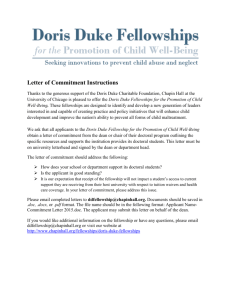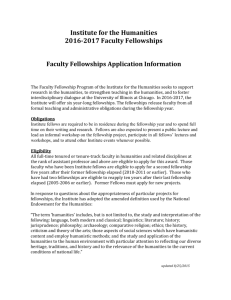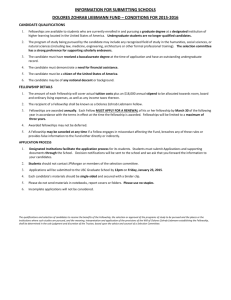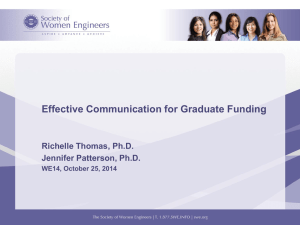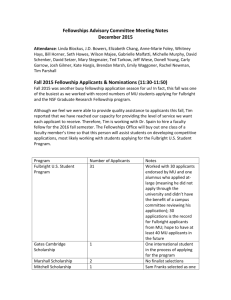Post-Graduate Fellowships Fact Sheet
advertisement
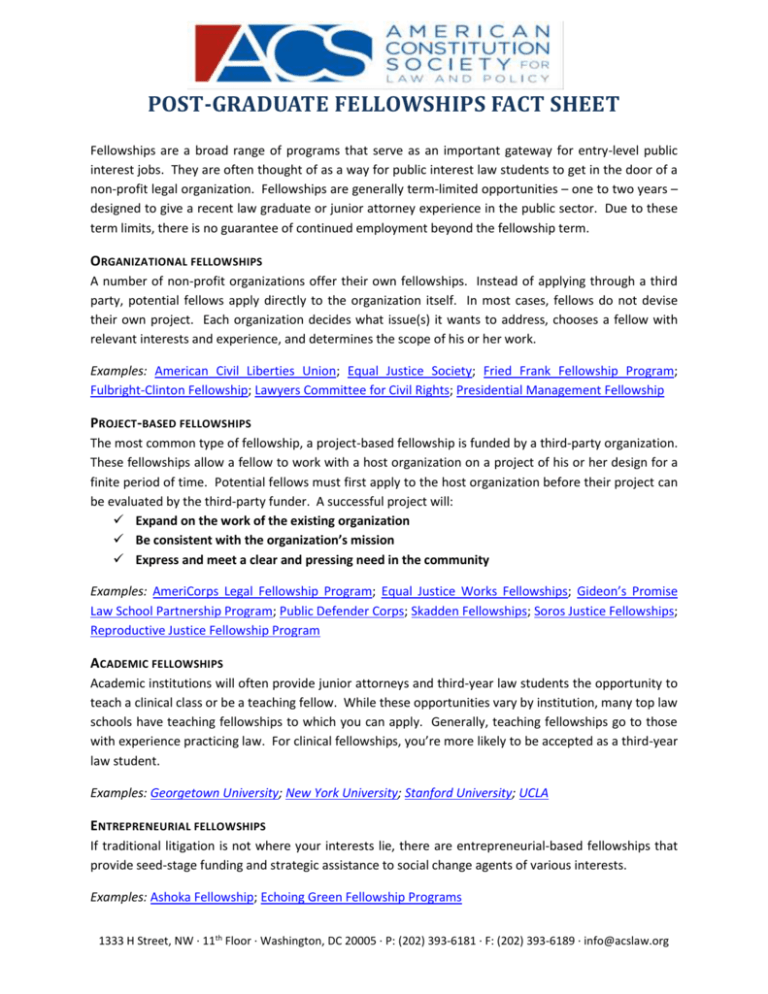
POST-GRADUATE FELLOWSHIPS FACT SHEET Fellowships are a broad range of programs that serve as an important gateway for entry-level public interest jobs. They are often thought of as a way for public interest law students to get in the door of a non-profit legal organization. Fellowships are generally term-limited opportunities – one to two years – designed to give a recent law graduate or junior attorney experience in the public sector. Due to these term limits, there is no guarantee of continued employment beyond the fellowship term. ORGANIZATIONAL FELLOWSHIPS A number of non-profit organizations offer their own fellowships. Instead of applying through a third party, potential fellows apply directly to the organization itself. In most cases, fellows do not devise their own project. Each organization decides what issue(s) it wants to address, chooses a fellow with relevant interests and experience, and determines the scope of his or her work. Examples: American Civil Liberties Union; Equal Justice Society; Fried Frank Fellowship Program; Fulbright-Clinton Fellowship; Lawyers Committee for Civil Rights; Presidential Management Fellowship PROJECT-BASED FELLOWSHIPS The most common type of fellowship, a project-based fellowship is funded by a third-party organization. These fellowships allow a fellow to work with a host organization on a project of his or her design for a finite period of time. Potential fellows must first apply to the host organization before their project can be evaluated by the third-party funder. A successful project will: Expand on the work of the existing organization Be consistent with the organization’s mission Express and meet a clear and pressing need in the community Examples: AmeriCorps Legal Fellowship Program; Equal Justice Works Fellowships; Gideon’s Promise Law School Partnership Program; Public Defender Corps; Skadden Fellowships; Soros Justice Fellowships; Reproductive Justice Fellowship Program ACADEMIC FELLOWSHIPS Academic institutions will often provide junior attorneys and third-year law students the opportunity to teach a clinical class or be a teaching fellow. While these opportunities vary by institution, many top law schools have teaching fellowships to which you can apply. Generally, teaching fellowships go to those with experience practicing law. For clinical fellowships, you’re more likely to be accepted as a third-year law student. Examples: Georgetown University; New York University; Stanford University; UCLA ENTREPRENEURIAL FELLOWSHIPS If traditional litigation is not where your interests lie, there are entrepreneurial-based fellowships that provide seed-stage funding and strategic assistance to social change agents of various interests. Examples: Ashoka Fellowship; Echoing Green Fellowship Programs 1333 H Street, NW · 11th Floor · Washington, DC 20005 · P: (202) 393-6181 · F: (202) 393-6189 · info@acslaw.org Choosing a Fellowship Answering the following questions will help guide you to the opportunity best suited for you: WHO do you want to help/work with? WHAT kind of law/work are you most interested in? WHEN do you plan to start/stop this work? WHERE do you want to do this work? WHY is a particular organization the best fit for you/your interests? HOW do you like to work – independently on your own project or as part of a team? Devising a Project for Project-Based Fellowships When evaluating a project-based fellowship applicant, organizations often consider the following: Applicant qualifications – Do you have the qualifications, the knowledge, and the experience to execute your project? Have you demonstrated a commitment to the host organization? Significant need for the project – Does the work that you’re going to do fill a gap in legal services? What data can you present to support this? Feasibility of the project designed to address that need – Can the project accomplish what you say it will? Is the connection between the need and the project clear and strong? Effectiveness of the sponsoring organization – Does the organization have a track record of success? Will it be able to supervise you and provide you with the resources you need? Good match between the applicant, the organization, and the project – Is the mission of the organization consistent with your project as well as the funder’s purposes and priorities? Project is DISCRETE and INNOVATIVE – How is your project distinct from what the organization is already doing? Applying for Fellowships Where you are in the fellowship process will determine your next steps: TIME DUTIES 1L YEAR 1L SUMMER Focus on your coursework. Do well in your first summer job or it will be difficult to find a host organization willing to work with you in the future. Speak with your 1L summer supervisor about your interest in a fellowship, project ideas, etc. If you did not enjoy your 1L summer experience, initiate a conversation with your 2L summer employer once you secure an offer. Have these conversations early! Watch for the following announcements and deadlines, as the application process tends to move quickly over a four-month period: JUNE – Host organizations announce in early summer that they are seeking fellows for a project-based fellowship JULY/AUGUST – Host organizations choose their fellows MID-SEPTEMBER – Fellowship applications are due to third-party funders Apply for fellowships with deadlines in the fall and throughout the year. If you were not accepted or wish to change your path after graduation, keep an eye out for opportunities open to recent graduates or junior attorneys. 2L YEAR 2L SUMMER 3L YEAR AFTER GRADUATION For more information, visit the Yale Public Interest Fellowship Guide and PSJD’s Post-Graduate Public Interest Fellowships Application Deadline List. 1333 H Street, NW · 11th Floor · Washington, DC 20005 · P: (202) 393-6181 · F: (202) 393-6189 · info@acslaw.org
